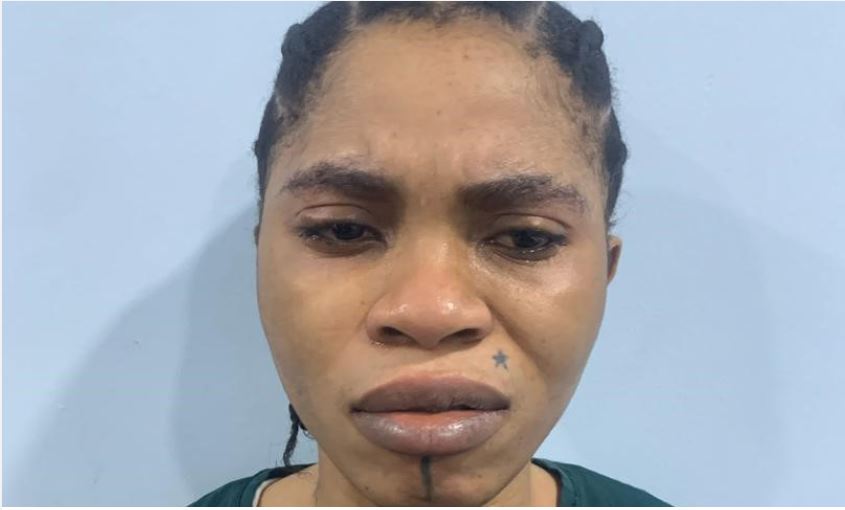Nigerian Hairdresser Sentenced to 5 Years in Ghana for Trafficking Young Women and Forcing Them into Prostitution
A Nigerian hairdresser, 22-year-old Nicky Isabella, also known as Bella, has been sentenced to five years in prison by the Achimota Circuit Court for trafficking two young Nigerian women to Ghana under the guise of offering them employment, only to force them into prostitution. The sentence was handed down after a full trial that culminated in Isabella’s conviction on two counts of human trafficking and one count of conspiracy to commit a crime. The case has garnered attention for its grim reminder of the persistence of human trafficking in the region, as well as the dire consequences that await perpetrators of such crimes.
The victims, two young women aged 22 and 23, were promised work at a supermarket in Adjiringanor, Accra, when Isabella lured them to Ghana. However, upon their arrival in the country, they were subjected to forced prostitution instead. The details of the case, presented by the prosecution led by Assistant Superintendent of Police (ASP) Isaac Babayi, revealed that Isabella took extreme measures to control the victims, including seizing their earnings and forcing them to swear an oath on a Bible.
YOU MAY READ
Police uncover hotel where children are used as sex slaves in Anambra (photos)
The court was told that as part of the oath ritual, Isabella forced the victims to cut pieces of their pubic hair, which she allegedly threatened to use in rituals if they defied her orders. The intimidation and coercion involved in this case paint a horrifying picture of the lengths traffickers go to maintain control over their victims.
The victims, two young women aged 22 and 23, were promised work at a supermarket in Adjiringanor, Accra, when Isabella lured them to Ghana. However, upon their arrival in the country, they were subjected to forced prostitution instead. The details of the case, presented by the prosecution led by Assistant Superintendent of Police (ASP) Isaac Babayi, revealed that Isabella took extreme measures to control the victims, including seizing their earnings and forcing them to swear an oath on a Bible.
The court was told that as part of the oath ritual, Isabella forced the victims to cut pieces of their pubic hair, which she allegedly threatened to use in rituals if they defied her orders. The intimidation and coercion involved in this case paint a horrifying picture of the lengths traffickers go to maintain control over their victims.
Isabella’s actions were uncovered after an investigation by the Ghanaian police. In May 2024, Isabella, along with an accomplice named Nelly, who is currently at large, trafficked the victims from Nigeria to Ghana. The victims were initially told they would be employed at a supermarket in Accra, but upon arrival, they were subjected to a much darker reality. They were coerced into prostitution, and all the earnings from their exploitation were taken by Isabella, leaving them with no means of escape.
During the trial, ASP Babayi emphasized the premeditated and exploitative nature of Isabella’s actions, arguing for a harsh sentence. The prosecution presented evidence, including Isabella’s notebook used to record the proceeds from the prostitution activities, and strands of human hair that were found during a subsequent search of her room. These items were part of the rituals she used to further intimidate and control her victims. Isabella’s admission of guilt in the case, along with the evidence provided, contributed to her conviction.
YOU MAY READ
Nigerians Will Shed Tears If They See Our Investigation
Her Honour Mrs. Akosua Anokyewaa Adjepong, who presided over the case, acknowledged several mitigating factors in Isabella’s defense, including her young age and her status as a first-time offender. However, the judge also noted that these factors were outweighed by the severity of the crime, Isabella’s lack of remorse, and the grave harm caused to the victims.
Despite the defense’s arguments, the judge handed down a sentence of five years in prison for Isabella, who broke down in tears upon hearing the verdict. The court also ordered that the victims, who were rescued after their ordeal, receive psychosocial support to aid in their recovery and reintegration into society.
The case has drawn widespread condemnation from both local and international organizations that work to combat human trafficking. Human rights groups have praised the Ghanaian authorities for their swift action in bringing the perpetrator to justice and rescuing the victims from their traumatic circumstances.
While Isabella’s conviction marks a significant step in the fight against human trafficking, the case is far from over. Nelly, Isabella’s accomplice who is believed to have played a pivotal role in the trafficking operation, remains at large. The Anti-Human Trafficking Unit of the Ghana Police Service has launched a manhunt to locate and apprehend Nelly, whose role in the exploitation of the victims has been described as integral to the operation.
Deputy Superintendent of Police (DSP) William Ayariga, the Director of the Anti-Human Trafficking Unit, expressed confidence that Nelly would be caught and prosecuted to the fullest extent of the law. “We will leave no stone unturned in our pursuit of justice,” he said in a statement following Isabella’s conviction. DSP Ayariga also reiterated Ghana’s zero-tolerance stance on human trafficking, stating that the country would not tolerate any form of exploitation of vulnerable individuals.
The case highlights the ongoing efforts by the Ghanaian authorities to combat human trafficking, which remains a serious issue across West Africa. DSP Ayariga also provided an update on the Anti-Human Trafficking Unit’s recent successes, revealing that the unit had secured nine convictions in the past year, including a 20-year sentence under the Human Trafficking Act. These convictions, he said, were part of a broader strategy to crack down on human trafficking and migrant smuggling in the country.
“We are not slowing down. We will continue arresting, investigating, and prosecuting offenders,” DSP Ayariga declared. “No form of human trafficking or migrant smuggling will be tolerated in Ghana. Justice will prevail.”
The Anti-Human Trafficking Unit has been instrumental in raising awareness about the dangers of human trafficking and working with local and international partners to prevent such crimes. The unit has also been involved in outreach programs aimed at educating vulnerable individuals, particularly young women, about the risks of trafficking and exploitation.
Following their rescue, the two young Nigerian women have been receiving comprehensive psychosocial support from local NGOs and government agencies. Their recovery journey will be long and challenging, but experts say that with the right support, they can rebuild their lives and regain a sense of agency and autonomy. The trauma they have experienced is not easily overcome, but many survivors of human trafficking have shown remarkable resilience and strength in the face of adversity.
Human trafficking survivors often face stigmatization and discrimination, and many struggle to reintegrate into society. However, there are various support systems in place in Ghana to help survivors rebuild their lives, including legal aid, counseling, and vocational training. These programs are essential in helping survivors regain their independence and break the cycle of exploitation.
The case of Nicky Isabella serves as a grim reminder of the global problem of human trafficking, which affects millions of individuals worldwide. Traffickers often prey on vulnerable individuals, luring them with false promises of employment and better opportunities, only to exploit them for labor or sex. This case underscores the importance of continued vigilance, cooperation, and enforcement to protect vulnerable populations from trafficking and exploitation.
International organizations, including the United Nations and the International Labour Organization, have been working with governments around the world to strengthen laws and policies aimed at preventing human trafficking. In addition to legal frameworks, these organizations are also focused on raising awareness about the issue and providing support to victims.
While the conviction of Nicky Isabella represents a significant victory for the fight against human trafficking in Ghana, it also highlights the need for ongoing vigilance and action. The authorities must continue their efforts to disrupt trafficking networks, prosecute perpetrators, and provide support to survivors. At the same time, there must be increased awareness at both the local and international levels about the signs of trafficking and the steps individuals can take to protect themselves and others.
For victims like those trafficked by Isabella, justice is an important first step toward healing, but much more must be done to prevent future crimes and ensure that traffickers are held accountable. In the face of this ongoing threat, the resilience of law enforcement agencies, as well as the dedication of anti-trafficking organizations, offers hope that the fight against human trafficking can be won.
YOU MAY READ
Two persons sentenced to d3ath by hanging and surgical castration for r3pe
The sentencing of Nicky Isabella to five years in prison is an important milestone in the ongoing battle against human trafficking in Ghana and beyond. While one trafficker has been brought to justice, the fight is far from over. The authorities, together with local and international partners, must remain steadfast in their commitment to eradicating trafficking and providing support to those whose lives have been destroyed by exploitation.
As the investigation continues and the search for Isabella’s accomplice Nelly intensifies, the case stands as a stark reminder of the dangers of trafficking and the critical need for continued vigilance and action to protect the most vulnerable members of society. The conviction of Isabella, while significant, represents only a small part of the larger, global effort to combat human trafficking and ensure that such crimes no longer go unpunished.





